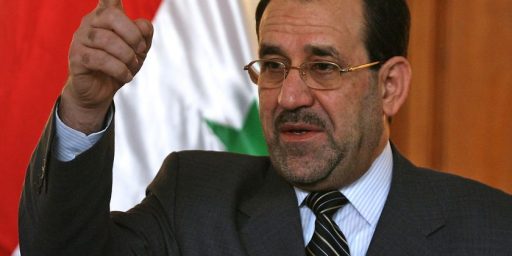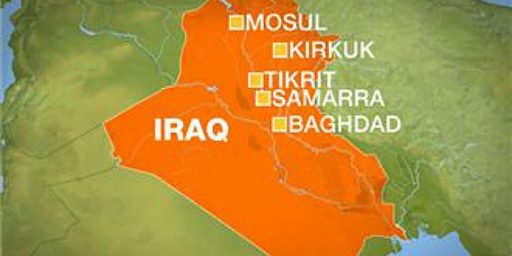Friedman: Double U.S. Troops in Iraq
Tom Friedman thinks the continued violence in Iraq is a result of the administration’s early decision to rely on a relatively small force and thinks there’s still time to reverse that decision.
Let’s Talk About Iraq (NYT | RSS)
[…] Yes, yes, I know we are training Iraqi soldiers by the battalions, but I don’t think this is the key. Who is training the insurgent-fascists? Nobody. And yet they are doing daily damage to U.S. and Iraqi forces. Training is overrated, in my book. Where you have motivated officers and soldiers, you have an army punching above its weight. Where you don’t have motivated officers and soldiers, you have an army punching a clock.
Motivation is primarily a function of training, though, combined with good leadership. The terrorists can get by with little training because they’re not a military force. They’re not fighting as a unit but rather using suicide bombers and IEDs against soft targets of opportunity.
Where do you get motivated officers and soldiers? That can come only from an Iraqi leader and government that are seen as representing all the country’s main factions. So far the Iraqi political class has been a disappointment. The Kurds have been great. But the Sunni leaders have been shortsighted at best and malicious at worst, fantasizing that they are going to make a comeback to power through terror. As for the Shiites, their spiritual leader, Ayatollah Ali al-Sistani, has been a positive force on the religious side, but he has no political analog. No Shiite Hamid Karzai has emerged.
“We have no galvanizing figure right now,” observed Kanan Makiya, the Iraqi historian who heads the Iraq Memory Foundation. “Sistani’s counterpart on the democratic front has not emerged. Certainly, the Americans made many mistakes, but at this stage less and less can be blamed on them. The burden is on Iraqis. And we still have not risen to the magnitude of the opportunity before us.”
The Shiites and Kurds, representing eighty percent of the Iraqi population, have been responsible. It’s only the minority Sunnis, ousted from their former predominance, who are operating outside the system. While an Iraqi Karzai may well be desirable, it’s difficult to see how more American troops will create one.
I still don’t know if a self-sustaining, united and democratizing Iraq is possible. I still believe it is a vital U.S. interest to find out. But the only way to find out is to create a secure environment. It is very hard for moderate, unifying, national leaders to emerge in a cauldron of violence.
Maybe it is too late, but before we give up on Iraq, why not actually try to do it right? Double the American boots on the ground and redouble the diplomatic effort to bring in those Sunnis who want to be part of the process and fight to the death those who don’t.
But American boots on the ground is a dual-edged sword. They both stand up against violence and inspire it. Getting Iraqi troops trained and making them responsible for their own security is simply essential.
If it’s motivation Friedman is after, there’s nothing like having to sink or swim on your own to provide it.
Brookings analyst Ivo Daalder, blogging at Josh Marshall’s place, shares Friedman’s concerns.
[…] [I]t is now clear that training Iraqi forces will take many more years to produce real, cohesive, and capable fighting forces — assuming that is even possible so long as the underlying politics remain as fractious as they are. Even under the most optimistic projections, though, current US troop levels would have to be maintained for two or more years just to keep some modicum of security (assuming, in fact, that we could do even that). And the political process is pretty paralyzed — with basic differences between Arab Sunnis and Shiites preventing even agreement on the process for writing the constitution. (To say nothing of the differences among Kurds, Sunnis, and Shiites over autonomy, religion, and oil revenue sharing that will have to be resolved when drawing up the constitution.)
[…]
We could announce that we will stay until a new constitution has been adopted and a constitutional government has been elected. This is the position of former national security adviser Anthony Lake. It has also been advocated by Sen. Ted Kennedy and my Brookings colleagues Mike O’Hanlon and Jim Steinberg. I endorsed this view in an earlier post. The problem with this position is that it assumes the political process will in fact produce results. That is a highly uncertain prospect, to say the least.
Certainly true. As the rest of Daalder’s piece notes, though, there are few good alternatives.
Pratike argues that we instead need to broaden our ambitions and get regional actors involved. He believes diplomatic initiatives to get Iran, Syria, Turkey, Egypt, Jordan, and Saudi Arabia into the mix–plus solving the Israeli-Palestinian mess–would go a long way to fixing Iraq. There’s little doubt of that. Of course, doing all of that is almost certainly more difficult than defeating the insurgent-terrorist coalition in Iraq.






“He believes diplomatic initiatives to get Iran, Syria, Turkey, Egypt, Jordan, and Saudi Arabia into the mix–plus solving the Israeli-Palestinian mess …”
Wow. And if wishes were horses, beggars would ride.
For all the Vietnam comparisons, I find Friedman’s argument bizarre.
I thought it was the US military dominating the war in Vietnam, failing to cultivate an autonomous government and an autonomous military, that led to our failure there. Exactly how would re-creating such a dependency benefit us in Iraq?
Would the government be perceived as stronger or weaker with a larger US military presence? Would the Iraqi military be more or less likely to stand and fight? (Keeping in mind that, at present, there’s quite a bit of American firepower there as is.)
As for praktike’s suggestion, a few considerations:
1. Saudi Arabia? You mean the Wahhabi stronghold from which much of the funding for Islamic terrorism (including al-Qaeda) comes from?
2. To help put down an insurgency that, from quite a few reports, is as much al-Qaeda and foreign fighters as it is Sunni Iraqis? Hmmm. Perhaps we should also have sought Soviet assistance in suppressing VC guerillas?
3. And Syria? Would that be the same Syria that the NYT and others have reported is regularly shipping insurgents and guerillas into Iraq in the first place?
Methinks that this is more a formula to ensure we lose, rather than a workable solution towards solving the problem.
Sounds to me like a LBJ-like response to the situation.
The whole idea is support not occupation.
I haven’t heard any Iraquis making “double the troops” requests. Have I missed something here?
And consider the anti war response to such an action.
Next thing you know Friedman will be calling for a draft so we can sustain the troop requirements.
Breathtaking.
The Jihadis are the biggest problem in Iraq. But we can’t forget that the base of the Jihadis are the Sunnis in Iraq (and elsewhere) who are not happy over the fact that they no longer rule Iraq. The Sunnis ran things under the Ottomans, under the British, and under Saddam. Now they don’t. So many people in the West don’t understand the centuries of hatred between Sunnis and Shiites. Throw in the Sunni non-Arab Kurds for good measure. Until the Sunnis accept their place as a MINORITY in Iraq, things won’t quiet down.
Cori Dauber has some harsh words for Friedman who says Iraqi military are just “punching the clock” but does not acknowledge the danger Iraqis face just standing in line to apply. My opinion on Friedman is that in order to justify the $50.00 to subscribe to his (and other) columns, he has to play to the anti-Bush, anti-conservative, anti-religious Central Park West denizens who will be forking over $50.00 to read his, MoDo, Krugman, Dionne, Herbert, etc. blatherings. Here’s Cori’s take: http://www.rantingprofs.com/rantingprofs/2005/06/what_part_of_as.html
Do you WANT to have the Kurds totally separate themselves from this process? Then just invite the Turkish Army into Northern Iraq, ands see how fast the ethnic cleansing and fighting breaks out. The Turks have been fighting their own war on terror against the Kurds for almost 100 years. Meanwhile the ethnic Kurds in eastern Turkey would like nothing better than an excuse to declare the country of Kurdistan, bring the Iraqi Kurds into the mix, oh and why not, involve the ethnic Kurds living in Iran and the Caucasus as well?
It’s a circular mess with no way out. One may ask, why it is that the troops are still there, and the usual answer is that ‘the insurgents need to be defeated’. But one also needs to ask the obvious, which is ‘why are the insurgents are still fighting us?’. One answer is supremely obvious: People, regardless of race, color, creed or whatever, tend to despise the presence of foreign troops on their land, especially foreign troops who are abusive, disrespectful or ignorant of ethnic customs and traditions. Doubling the number of troops on the ground will merely provide more targets for the insurgents, and undoubtedly will encourage more angry Iraqis to join the insurgency.
Think of it this way, (and I think Defense Sec. Rumsfeld put it correctly when he said that the insurgency could go on for a decade of more): If it was America that happened to on the sharp end of a superior and unwelcome foreign occupying force (fortunately, this is a thought experiment rather than a likely future scenario), I would imagine that most able-bodied patriotic Americans capable of firing a weapon would be taking the fight to the enemy in whatever way they could. I would for sure. This is a no-brainer.
I am not suggesting a way out of this mess for the simple reason that a workable solution involves some degree of “loss-of-face” for the architects of this war. Knowing that “loss-of-face” is the ultimate no-go area for testosterone-addled hawks in the Pentagon, then its plain that we are in there for a long and painful haul.